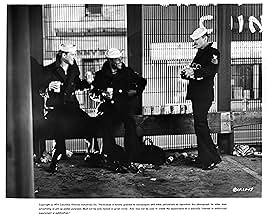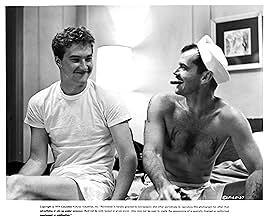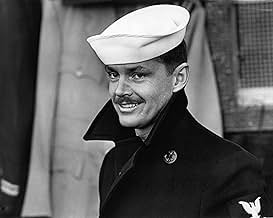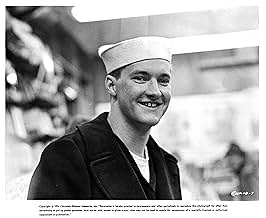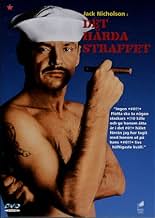Two Navy men are ordered to bring a young offender to prison, but decide to show him one last good time along the way.Two Navy men are ordered to bring a young offender to prison, but decide to show him one last good time along the way.Two Navy men are ordered to bring a young offender to prison, but decide to show him one last good time along the way.
- Nominated for 3 Oscars
- 6 wins & 9 nominations total
Patricia Hamilton
- Madame
- (as Pat Hamilton)
- Director
- Writers
- All cast & crew
- Production, box office & more at IMDbPro
Featured reviews
If you respond to this film, you will probably go all the way and love it as much as I do. It is probably the high point of the drama of social realism started back by the like of "Marty."
It is Nicholson's film, yet Quaid and Otis Young(in his only good movie) really shine as well. It is the most heartbreaking of material played without sap or sentiment. Obscenity like this was still pretty new to movies back in 73, be sure to avoid edited T.V. versions. Reading the comments, it is sad that todays movie fans, spoonfed sledgehammer crappola, really can't respond to a drama played with the kind of subtle grace of "The Last Detail." Give it a shot. Ten out of ten.
It is Nicholson's film, yet Quaid and Otis Young(in his only good movie) really shine as well. It is the most heartbreaking of material played without sap or sentiment. Obscenity like this was still pretty new to movies back in 73, be sure to avoid edited T.V. versions. Reading the comments, it is sad that todays movie fans, spoonfed sledgehammer crappola, really can't respond to a drama played with the kind of subtle grace of "The Last Detail." Give it a shot. Ten out of ten.
My absolutely favorite Jack Nicholson film has always and forever will be The Last Detail. I don't think he was ever better on the screen as William Baddusky of the United States Navy. I enjoyed his performance and the film itself on so many levels. Probably not surprising since the script was done by Robert Towne who would soon be teaming with Nicholson again for the critical and popular success Chinatown.
It's a simple story, not really any plot to the film. Two sailors, Jack Nicholson and Otis Young, both of them lifers in the Navy are stationed in Norfolk and get themselves an assignment to escort a prisoner to the Naval Stockade at Portsmouth. Of course with the per diem allowance for the two men and the prisoner and five days to travel in, Nicholson and Young are thinking of a mini-spree at government expense.
It comes to that and a lot more. the prisoner is newcomer Randy Quaid whose big crime is that he attempted to steal $40.00 from a charity collection box. For that he's getting eight years in military prison and a dishonorable discharge. A dishonorable discharge even today is not a good thing for one's resume.
As Nicholson and Young both remark, someone really stuck it to him. Let's face it what Quaid did in civilian life would probably be considered petty larceny and his jail time might be measured in days. Turned out it was the base commander's wife's favorite charity so it got stuck to him good. Sad because the indications we get is that Quaid was a troubled kid in civilian life and probably military service offered him a chance to straighten up and fly right.
It's done that for many others including Nicholson and Young who make it very clear even on this disagreeable detail they do like the Navy and like serving in it.
They've got five days to deliver Quaid to Portsmouth so the journey becomes quite the odyssey for the three of them up the Atlantic coast. The three men have a great chemistry between them, you get involved with their lives and really feel for young Quaid and his plight. Quaid gets shown a good time and maybe that's not such a good thing considering what he is facing.
The Last Detail is a nice realistic look at the military both its flaws and good points. A lot of similarity here in the issues raised to From Here to Eternity and if I mention The Last Detail in the same sentence favorably as From Here to Eternity, you know how good it must be.
It's a simple story, not really any plot to the film. Two sailors, Jack Nicholson and Otis Young, both of them lifers in the Navy are stationed in Norfolk and get themselves an assignment to escort a prisoner to the Naval Stockade at Portsmouth. Of course with the per diem allowance for the two men and the prisoner and five days to travel in, Nicholson and Young are thinking of a mini-spree at government expense.
It comes to that and a lot more. the prisoner is newcomer Randy Quaid whose big crime is that he attempted to steal $40.00 from a charity collection box. For that he's getting eight years in military prison and a dishonorable discharge. A dishonorable discharge even today is not a good thing for one's resume.
As Nicholson and Young both remark, someone really stuck it to him. Let's face it what Quaid did in civilian life would probably be considered petty larceny and his jail time might be measured in days. Turned out it was the base commander's wife's favorite charity so it got stuck to him good. Sad because the indications we get is that Quaid was a troubled kid in civilian life and probably military service offered him a chance to straighten up and fly right.
It's done that for many others including Nicholson and Young who make it very clear even on this disagreeable detail they do like the Navy and like serving in it.
They've got five days to deliver Quaid to Portsmouth so the journey becomes quite the odyssey for the three of them up the Atlantic coast. The three men have a great chemistry between them, you get involved with their lives and really feel for young Quaid and his plight. Quaid gets shown a good time and maybe that's not such a good thing considering what he is facing.
The Last Detail is a nice realistic look at the military both its flaws and good points. A lot of similarity here in the issues raised to From Here to Eternity and if I mention The Last Detail in the same sentence favorably as From Here to Eternity, you know how good it must be.
I read somebody's comment that this film isn't "deep." I think that viewer missed a whole layer of the story. you have to keep in mind that this was written and produced during the vietnam war and released during the early months of Watergate.
The story is about these two working class sailors, who are completely disenfranchised, just "doing their job." They're good guys but in the end, don't lift a finger to stop a massive injustice. They don't even take the time to think about it, because they feel there's nothing they can do about it. They pay lip services to how wrong things are about the situation, but in the end they do what "the man" says and they're just as much to blame for the problem as the commanding officers above them.
Through the course of the film, the sailors meet a lot of "chatting class" folks who are mad at Nixon and discussing politics, and they meet Hari Krishnas who are chanting to change things, but nobody is really taking any ACTION. Everyone is pissed off at the injustice of the world but nobody does anything about it. It's about inaction. And that inaction slowly boils up in the main characters and turns into anger that brings the film to a sad end. (It's one of those great stories that gets you pissed off at the injustice in the world...)
Having said all that, on a more tangible level, the performances and scripting are full of emotion and Nicholson's and Quaid's performance are amazing and hilarious to watch. But this isn't really a comedy in the end...more tragic really (with some good laughs along the way).
Check it out!
The story is about these two working class sailors, who are completely disenfranchised, just "doing their job." They're good guys but in the end, don't lift a finger to stop a massive injustice. They don't even take the time to think about it, because they feel there's nothing they can do about it. They pay lip services to how wrong things are about the situation, but in the end they do what "the man" says and they're just as much to blame for the problem as the commanding officers above them.
Through the course of the film, the sailors meet a lot of "chatting class" folks who are mad at Nixon and discussing politics, and they meet Hari Krishnas who are chanting to change things, but nobody is really taking any ACTION. Everyone is pissed off at the injustice of the world but nobody does anything about it. It's about inaction. And that inaction slowly boils up in the main characters and turns into anger that brings the film to a sad end. (It's one of those great stories that gets you pissed off at the injustice in the world...)
Having said all that, on a more tangible level, the performances and scripting are full of emotion and Nicholson's and Quaid's performance are amazing and hilarious to watch. But this isn't really a comedy in the end...more tragic really (with some good laughs along the way).
Check it out!
The Last Detail by Hal Ashby is much like John Schlesinger's Midnight Cowboy in that they are both road trip movies as well as buddy movies. They are about friendships that forged in extreme circumstances and the effect that these experiences have on each character's lives.
In the last detail, an unfortunate seaman by the name of Meadows (Randy Quaid) is condemned to jail for eight years for a misdemeanor crime he was unable to even complete. Being caught with his hand in the cookie jar after a mere forty dollars, he is consequently transported from a naval base in the south to the naval prison in Portsmouth, Maine. The last detail of a few veteran naval officers, namely Billy "Bad Ass" Buddusky (Jack Nicholson) and "Mule" Mulhall (Otis Young) is to transport this eighteen year old, soon to be prisoner up the east coast.
The three gentlemen have never met before and all seem to have different interests. Billy and Mule are after some welcomed time off from the suffocating life on the naval base, while Meadows is drowning in his own depression. Billy is more of a lenient presence, while Mule seems to want to do his duty first and then relax. Soon the men form a bond. This bond and their relationship is what carry the movie. Meadows is an innocent and modest teenager who found his way into the navy because of a shop lifting problem. However, after hearing his story and spending time with the boy, the two officers realize the ludicrous charges that have been brought against such an undeserving soldier.
They take pity on him and decide to make his last days of freedom ones in which he will cross every right of passage yet to be undiscovered and make them days that he will never forget. As they gradually open up to each other, they grant the prisoner a certain degree of freedom beginning with the removal of the cuffs in the beginning of the movie. They get him drunk in Washington, D.C., involve him in his first fist fight in New York City and help him lose his virginity in Boston. Beyond these rights of passage, the officers also relate to the emotional side of Meadows. They allow him to visit his mother. What the two officers did not realize is that the journey they would take would be reciprocal. They all end up taking their guard down.
One of the more poignant lines in the film is when Meadows refers to the officers as his beast friends. Although he has only known them for less than a week, the sad fact is that these men are probably the closest friends that he has ever had. Mule and Billy have had much more life experience and are well versed in the details and idiosyncrasies that life involves. They connect with meadows because before this trip, he had been yet untouched by the worse side of life. His general doe eyed demeanor drives home the fact that he really does not deserve the treatment that he's receiving. Upon leaving the prison, I don't believe that Mule and Billy are so much angry with the way the ascending officer treated them as they are with the situation that Meadows is now faced with. "We could have prevented this.
In the last detail, an unfortunate seaman by the name of Meadows (Randy Quaid) is condemned to jail for eight years for a misdemeanor crime he was unable to even complete. Being caught with his hand in the cookie jar after a mere forty dollars, he is consequently transported from a naval base in the south to the naval prison in Portsmouth, Maine. The last detail of a few veteran naval officers, namely Billy "Bad Ass" Buddusky (Jack Nicholson) and "Mule" Mulhall (Otis Young) is to transport this eighteen year old, soon to be prisoner up the east coast.
The three gentlemen have never met before and all seem to have different interests. Billy and Mule are after some welcomed time off from the suffocating life on the naval base, while Meadows is drowning in his own depression. Billy is more of a lenient presence, while Mule seems to want to do his duty first and then relax. Soon the men form a bond. This bond and their relationship is what carry the movie. Meadows is an innocent and modest teenager who found his way into the navy because of a shop lifting problem. However, after hearing his story and spending time with the boy, the two officers realize the ludicrous charges that have been brought against such an undeserving soldier.
They take pity on him and decide to make his last days of freedom ones in which he will cross every right of passage yet to be undiscovered and make them days that he will never forget. As they gradually open up to each other, they grant the prisoner a certain degree of freedom beginning with the removal of the cuffs in the beginning of the movie. They get him drunk in Washington, D.C., involve him in his first fist fight in New York City and help him lose his virginity in Boston. Beyond these rights of passage, the officers also relate to the emotional side of Meadows. They allow him to visit his mother. What the two officers did not realize is that the journey they would take would be reciprocal. They all end up taking their guard down.
One of the more poignant lines in the film is when Meadows refers to the officers as his beast friends. Although he has only known them for less than a week, the sad fact is that these men are probably the closest friends that he has ever had. Mule and Billy have had much more life experience and are well versed in the details and idiosyncrasies that life involves. They connect with meadows because before this trip, he had been yet untouched by the worse side of life. His general doe eyed demeanor drives home the fact that he really does not deserve the treatment that he's receiving. Upon leaving the prison, I don't believe that Mule and Billy are so much angry with the way the ascending officer treated them as they are with the situation that Meadows is now faced with. "We could have prevented this.
Don't let the fact that the DVD cover makes this movie look like gay porn keep you from seeing it.
Director Hal Ashby made a string of unfussy but very, very good films throughout the 1970s, and "The Last Detail" is one them. The story doesn't sound like much: two Navy officers are assigned to escort a third to the prison where he will be serving time. Along the way, the requisite male bonding ensues, and the older, jaded officer (Jack Nicholson) has a chance to reflect upon his own fortune and misfortune and be a sort of father figure, for better or worse, to his young and troubled charge (played extremely well by Randy Quaid).
Like all of Ashby's films, "The Last Detail" challenges things like duty and institutional authority, which made Ashby one of the most vocal of the anti-establishment directors from a volatile period of American history. But also like all of his films, it poses challenges in a low-key, non-confrontational way, without sacrificing its bite.
Well done.
Grade: A
Director Hal Ashby made a string of unfussy but very, very good films throughout the 1970s, and "The Last Detail" is one them. The story doesn't sound like much: two Navy officers are assigned to escort a third to the prison where he will be serving time. Along the way, the requisite male bonding ensues, and the older, jaded officer (Jack Nicholson) has a chance to reflect upon his own fortune and misfortune and be a sort of father figure, for better or worse, to his young and troubled charge (played extremely well by Randy Quaid).
Like all of Ashby's films, "The Last Detail" challenges things like duty and institutional authority, which made Ashby one of the most vocal of the anti-establishment directors from a volatile period of American history. But also like all of his films, it poses challenges in a low-key, non-confrontational way, without sacrificing its bite.
Well done.
Grade: A
Did you know
- TriviaThe script was completed in 1970 but contained too much profanity to be shot as written. Columbia Pictures waited for two years trying to get writer Robert Towne to tone down the language. Instead, by 1972, the standards for foul language relaxed so much that all the profanity was left in.
- GoofsThe MAA Master Chief is not wearing a Master-at-Arms rating badge; he is wearing a Boatswain mate rating badge.
The Master At Arms rating was disestablished in 1921, but was officially re-established on 1 August 1973. Therefore, as the story takes place, a Master Chief Boatswain's Mate being assigned the collateral duty of MAA is entirely accurate.
- SoundtracksNever Let The Left Hand Know
by Jack Goga
- How long is The Last Detail?Powered by Alexa
Details
- Release date
- Country of origin
- Official sites
- Language
- Also known as
- El último deber
- Filming locations
- Production companies
- See more company credits at IMDbPro
Box office
- Budget
- $2,300,000 (estimated)
Contribute to this page
Suggest an edit or add missing content



